Think about it—when was the last time you answered a cold sales call? The truth is nearly 97 percent of such calls get ignored. Traditional methods like these are losing their edge, leaving businesses searching for more effective ways to generate leads. With generating high-quality leads ranking as a top priority for marketers, it’s clear that outdated approaches aren’t cutting it.
Lead generation through affiliate marketing is the perfect modern strategy. It leverages trusted relationships between partners and their engaged audiences to deliver leads primed to convert. By building on the trust and credibility of partners, affiliate marketing addresses key lead gen challenges, including:
- Connecting with the right audience
- Overcoming trust barriers
- Improving lead quality
It’s not just about reaching people—it’s about reaching the right people in a way that resonates. Here’s how affiliate marketing can transform your lead gen efforts, detailing actionable strategies and insights to create meaningful and measurable results.
Key takeaways
- Build trust through partnerships: Affiliate marketing leverages partners with established audience trust to generate leads more likely to convert.
- Leverage diverse partner types: Collaborate with content creators, influencers, email marketers, and review sites to connect with potential customers across varied touchpoints.
- Choose the right lead gen model: Brands can opt for the host-and-post model, where affiliates gather and share leads, or the brand-hosted model, where leads are collected directly on the brand’s site through affiliate links.
- Optimize spending with performance-based strategies: Affiliate marketing offers flexibility with models like cost-per-lead (CPL), where brands pay affiliates for each lead. These models ensure brands pay for results while affiliates earn based on their contributions, creating a mutually beneficial system.
Affiliate marketing’s role in driving smarter lead generation
Lead generation is a process brands use to identify and cultivate potential customers who could be interested in your products or services. It’s the first step in building relationships with prospects before they become paying customers.
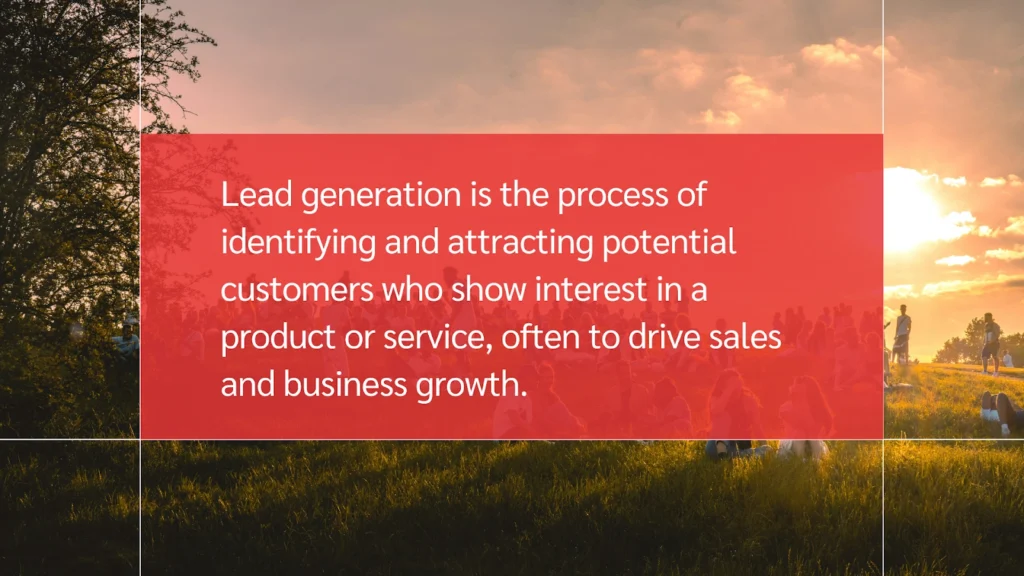
Lead gen is especially significant in affiliate marketing because it combines the power of partnerships with targeted marketing efforts.
Many marketers struggle to convert traffic into leads. This often stems from unfocused campaigns or insufficient trust-building with the audience.
Affiliate marketing solves this through partners’ established audience trust—and because a third-party endorsement can sound less biased than a direct ad from your brand.
Success in affiliate marketing comes from finding partners with the right audience match. For example, fitness influencers for athletic apparel, esports channels for gaming keyboards, and engineering newsletters for coding software.
Benefits of leveraging affiliate marketing for lead generation.
Affiliate marketing isn’t just a smart choice for lead gen—it’s a strategic game-changer. Here’s a closer look at the benefits that make affiliate marketing an indispensable tool for modern marketers.
- Builds trust and credibility: Affiliate marketing generates leads from trusted sources, making them more likely to engage and convert.
- Extends audience reach: Affiliate partners connect your brand to diverse, targeted audiences, expanding reach beyond traditional channels.
- Focuses on quality over quantity: Leads come through recommendations that align with your brand, increasing the likelihood of attracting genuinely interested prospects.
- Optimizes costs with performance-based models: You only pay for results like leads or conversions, ensuring ROI is maximized and waste is minimized.
- Accesses niche audience segments: Affiliate partnerships allow you to tap into smaller, focused audience groups that would be difficult to reach through generalized marketing efforts.
- Leverages diverse channels: Affiliate marketing uses a mix of platforms—blogs, social media, podcasts, newsletters—giving you multiple avenues to connect with potential leads wherever they consume content.
- Provides actionable insights: Tracking tools provide data to refine lead gen strategies, ensuring ongoing improvement and better results.
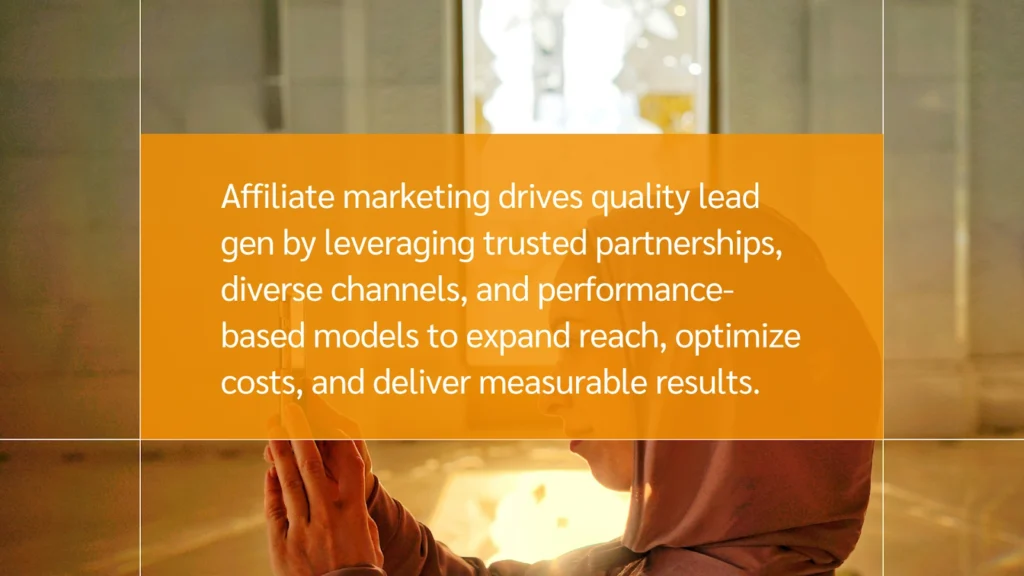
4 Popular types of lead generation affiliate partners
Generating leads successfully requires the right mix of partners who can reach your target audience. Each type brings unique value—from educational content that attracts research-minded prospects to reviews that build instant credibility through social proof.
Some partners may overlap categories, but understanding these distinct approaches will help you build a diverse and effective partner mix.
1. Content partners
Content partners attract potential leads by creating valuable, informative materials.
These affiliates might:
- Write blog posts about niche topics that link to your brand.
- Create downloadable guides or ebooks in exchange for an email address.
- Develop comparison charts or buying guides that feature your product.
- Produce video tutorials to familiarize audiences with your product.
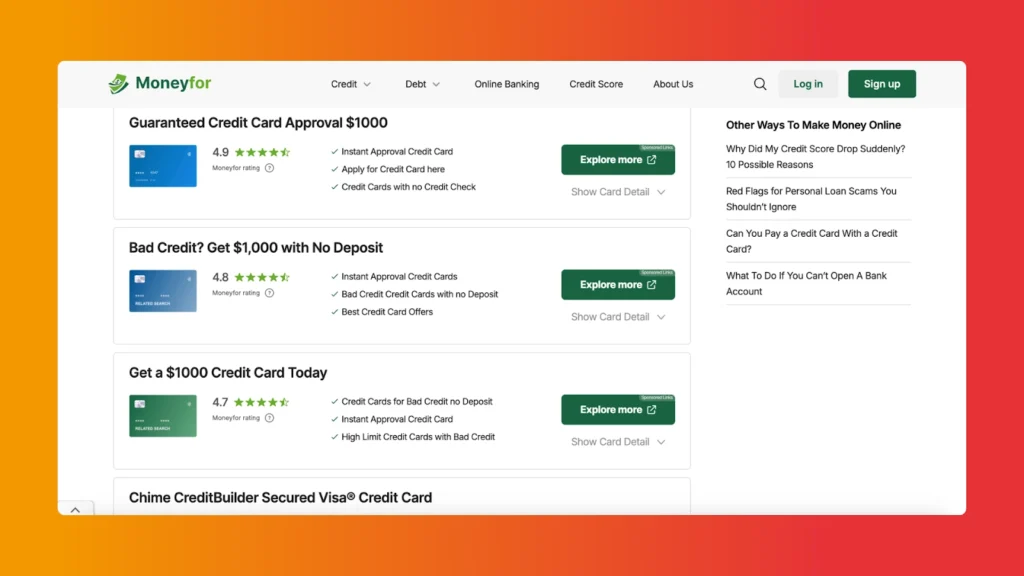
Description: Moneyfor provides information such as Credit Cards with a $500+ Limit to help Americans navigate finances on their terms.
2. Social media influencers
Influencers leverage their engaged audiences to generate leads for brands through sponsored content like:
- Giveaways that capture user information
- Exclusive discounts that require an email signup
- Posts and live streams showcasing your products or services
Description: Planet Fitness teams up with @tyneciawilson_ to drive app sign-ups and promote PerkFest
3. Email partners
Email partners help leverage their dedicated subscriber base to capture leads.
Reach their audiences by partnering on email newsletter content like:
- Sponsorships that highlight your offer
- Exclusive offers for being a subscriber
- Emails that weave your brand naturally into your partner’s content
- Segmented newsletter campaigns to reach the most relevant audience
4. Review and comparison sites
Review and comparison sites attract prospects who actively evaluate options, making them highly effective for lead generation. These platforms simplify complex decisions by providing detailed analyses and comparisons.
Here’s how they generate leads:
- Publish in-depth product or service reviews that include affiliate links to your brand.
- Feature side-by-side comparisons of multiple options within a category, positioning your brand as a standout choice.
- Create “best of” lists tailored to specific needs or industries, driving targeted traffic to your landing pages.
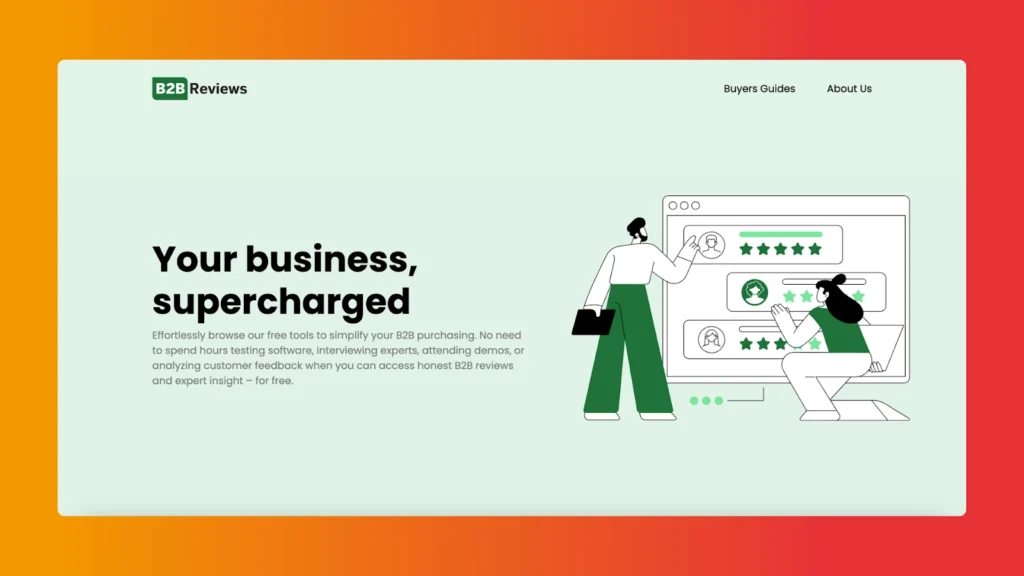
Description: B2B Reviews delivers high-quality, unbiased, and thorough reviews of B2B tools and software.
Let’s get specific: how partnerships work for affiliate marketing lead generation
On a basic level, affiliate partnerships involve two main parties:
- Brands looking for customers
- Affiliates generating leads for the brand
Affiliate partners gather leads directly or refer their audience to the brand using an affiliate link. That link directs people to specific landing pages—to convert into leads using a form—or product pages to convert directly into customers.
Choosing a lead generation model:
There are two lead gen models to choose from: the “host and post” model and the brand-hosted model. Each has its pros and cons.
When choosing your model, it’s important to consider the following criteria:
- Business goals: Identify your priorities, such as control, speed, and budget.
- Target audience: Consider where your prospects feel most comfortable sharing their information.
- Available resources: Determine if you have the infrastructure for brand-hosted or if host and post would be more manageable.
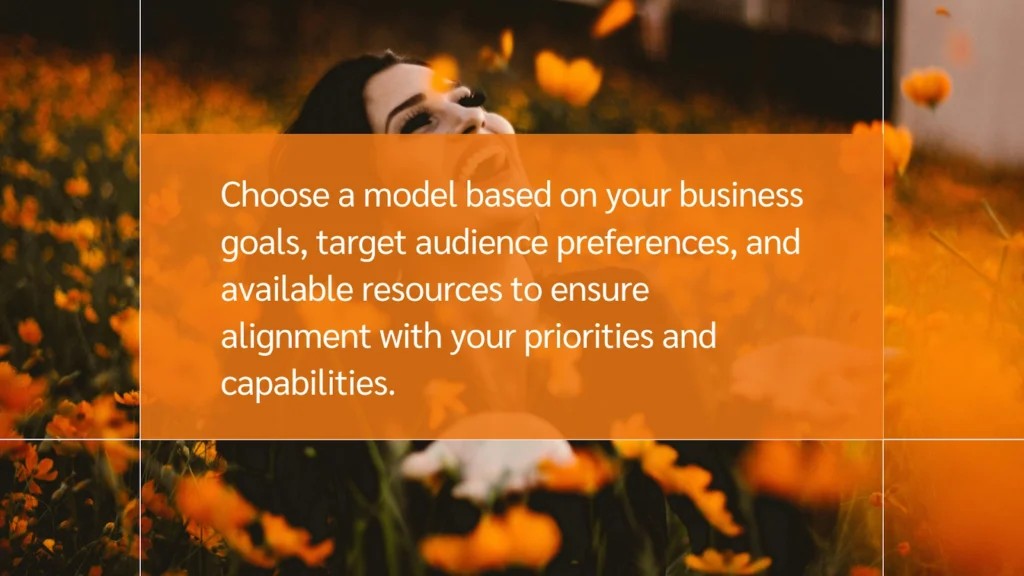
1. Host and post model
In this model, affiliates collect leads on their platforms and then share them with the brand.
Pros:
- Publishers maintain control over lead collection methods
- Leverages publishers’ existing audience trust
- Faster implementation time
- More flexible data collection options
Cons:
- Potential quality control issues
- Less direct brand interaction with leads
- Additional steps in data transfer
2. Brand-hosted model
Brand-hosted models allow the company to collect leads directly on their website through affiliate links.
Pros:
- Complete control over user experience
- Direct data collection and management
- Immediate access to lead information
- Consistent branding throughout the process
Cons:
- Higher setup costs
- Requires robust infrastructure
Choosing a compensation model:
Your compensation model can impact affiliates’ motivation and your results. So, it’s essential to consider the following factors that balance your business goals with partner incentives, ensuring long-term program success and sustainable growth.
- Alignment with business goals: Based on your goals, choose a model that supports lead volume, quality, or quick conversions.
- Partner expectations: Match the structure to what motivates your partners, like lead rewards or higher conversion payouts.
- Cost-effectiveness: Ensure the model offers strong ROI in the short and long term.
- Transparency and fairness: To build trust and stronger partnerships, keep the structure clear and equitable.
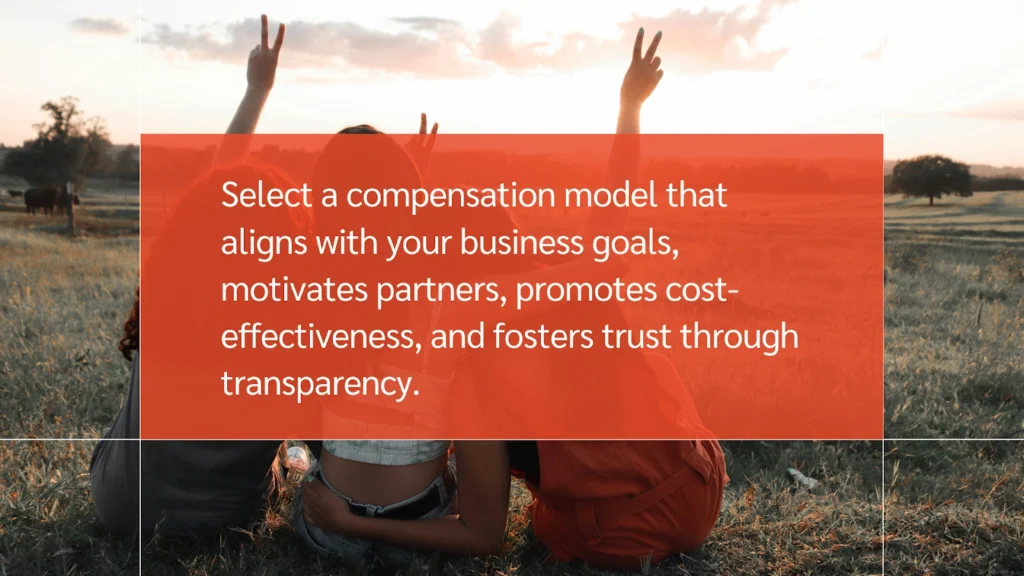
1. Cost per lead
Cost per lead (CPL) compensates affiliates for every verified lead they generate, regardless of whether it converts into a sale.
Advantages for affiliates:
- Guaranteed payment for every valid lead delivered.
- Lower risk as payment doesn’t rely on conversions.
- Clear performance metric tied to lead volume.
Advantages for businesses:
- Predictable costs tied directly to lead acquisition.
- Focus on building a qualified prospect pipeline.
- Simplicity in tracking and managing payments.
2. Revenue share
Revenue share affiliates earn a percentage of the revenue generated from leads they bring in once those leads convert.
Advantages for affiliates:
- Potential for higher earnings if leads convert frequently.
- Motivates affiliates to provide high-quality leads.
- Long-term earning opportunity tied to customer lifetime value.
Advantages for businesses:
- Payment is directly tied to actual revenue generated.
- Encourages affiliates to prioritize lead quality over volume.
- Reduces upfront costs for lead acquisition.
3. Hybrid model
The hybrid model combines CPL and revenue share elements, offering upfront payments for leads and a share of revenue from conversions.
Advantages for affiliates:
- Balanced earning structure combining immediate payouts and long-term potential.
- Incentivizes both lead volume and quality.
- Flexibility to appeal to a broader range of affiliates.
Advantages for businesses:
- Addresses both lead gen and revenue objectives.
- Attracts diverse affiliates with varied incentives.
- Optimizes ROI by fostering both quantity and quality of leads.
Nailing down the lead generation timeline for partnerships
Here’s how the lead gen process typically flows when working with affiliate partners:
- A publisher recommends your product or service to their audience.
- Someone in their audience clicks your affiliate links or fills out a submission form.
- Your affiliate software tracks the lead and attributes it to the right partner.
- Commission payments trigger automatically, depending on your partnership agreement.
- Your team tracks lead performance and sales using affiliate software.
With this foundation, you can optimize performance through ongoing measurement and feedback to partners.
Frequently asked questions
Lead generation is attracting and capturing potential customer interest in a product or service, typically through methods like email campaigns, social media, landing pages, and content marketing, to drive sales and business growth.
Affiliate partnerships for lead generation involve affiliates promoting a brand’s products or services to drive potential customers to submit their contact information. Affiliates use unique tracking links to ensure accurate lead attribution, and partners are typically compensated based on a Cost-per-lead (CPL) or revenue-sharing model.
The most important metrics for lead generation include the following:
- Conversion rate, which measures the percentage of leads that turn into customers
- Cost per lead (CPL), which tracks the expense of acquiring a single lead
- Lead quality, which evaluates the potential of leads to result in sales
- Return on investment (ROI), which assesses the overall profitability of lead generation efforts.
The future of lead generation in affiliate marketing
Affiliate partnerships excel at lead generation. They leverage the trust and influence of established publishers to reach the right audience. They’re mutually beneficial—motivating both parties to collaborate and work together for better results. And they’re cost-effective since you only pay for results.
If you’re new to affiliate marketing, using a platform like impact.com grants you access to partner discovery tools, customizable affiliate models, tracking software, payment tools, and more.




